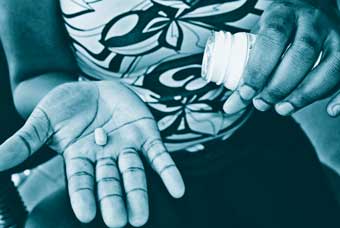FHI 360’s scientific research continues to be at the forefront of efforts to evaluate a variety of safe, effective HIV prevention methods, so that women can choose methods that best suit their lifestyles and preferences.
Women and girls, particularly those living in sub-Saharan Africa, are among those most at risk of contracting HIV. Gender norms and cultural practices can prevent them from refusing risky sex or asking their partners to use condoms. Women urgently need HIV prevention tools to safeguard their health. Products that deliver antiretroviral (ARV) drugs offer one possibility of putting the power of HIV prevention into women’s hands.
For more than a decade, FHI 360 has been a leader in clinical research in and the promotion of woman-controlled HIV prevention methods. FHI 360’s landmark FEM-PrEP trial assessed whether a daily dose of the antiretroviral combination pill Truvada® was safe and effective at preventing HIV infection among women at high risk of HIV exposure. Despite targeted counseling and support, adherence to the drug regimen was too low for the researchers to determine whether Truvada was effective. The FEM-PrEP trial highlighted the need to know more about adherence within a placebo-controlled clinical trial.
FEM-PrEP researchers were the first to investigate the reasons for poor adherence to ARV-based regimens in recent trials. Their follow-up study found that many of the women became concerned about taking the study pill because of discouragement from partners, peers and the community and fear of side effects. The size of the pill and the need for daily use were also cited as barriers to adherence. These results are helping to guide the design of future trials and the introduction of proven ARV-based prevention methods.
Using the lessons of FEM-PrEP, FHI 360 is collaborating on some of the first HIV prevention trials of injectable ARVs and vaginal rings containing ARVs and is spearheading research to improve adherence support and measurement.

Women urgently need HIV prevention tools to safeguard their health
